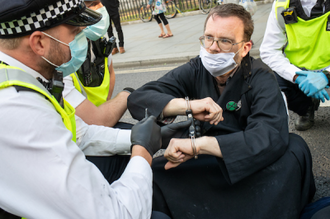Birmingham priest arrested in Extinction Rebellion protest

Police arrest Fr Martin Newell - Photo: Sean Hawkey/WCC
Source: Christian Climate Action
A Birmingham priest has been arrested in Westminster in a new wave of climate change protests organised by Extinction Rebellion. Fr Martin Newell was arrested on 1 September as protestors sat on a road outside Parliament on the first day of the 'September Uprising'.
The protestors, many of them young people, had vowed to occupy the streets until MPs back a Climate and Ecological Emergency Bill which was tabled in the Commons that day.
Prior his arrest, Fr Newell explained that he took part "because the climate and environmental emergency is the biggest challenge facing the human family'. He said, 'We need a political earthquake if we are going to make the massive changes needed in the short time necessary. We have to be ready to make sacrifices to protect God's people, especially the poorest, and the life of God's Earth."
The Roman Catholic priest, a member of the Passionist religious order, runs a house of hospitality for destitute asylum seekers in Sparkhill. He travelled to London to join the protest with Christian Climate Action. The group includes Christians who support Extinction Rebellion, which uses nonviolent civil disobedience to compel government action on climate breakdown. Christian Climate Action held a vigil for the earth, with prayer services day and night, to help people share and process their experience of climate grief.
Fr Newell was one of numerous clerics and people of other faiths taking part in the rebellion. This month's protests were joined by former Archbishop of Canterbury Dr Rowan Williams. The Roman Catholic auxiliary bishop of Southwark Rt Rev Paul Hendricks also joined a prayer service at the Parliament Square protests.
The Climate and Ecological Emergency Bill is a response prepared by scientists, lawyers and activists to address the fact that current commitments by governments are placing the earth at risk of catastrophic climate change. The Bill requires the UK government to play its part in ensuring global temperatures do not exceed a critical threshold.


















